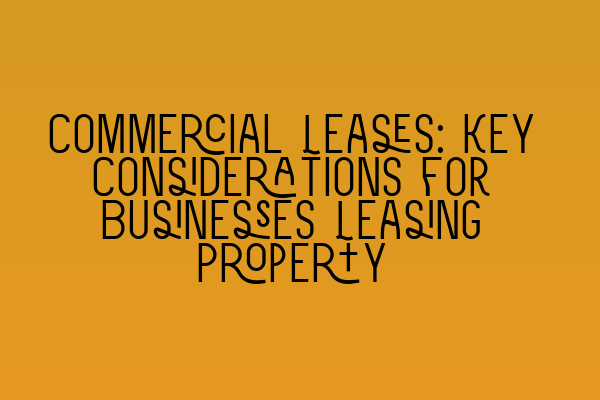Commercial Leases: Key Considerations for Businesses Leasing Property
When it comes to starting or expanding a business, one of the most crucial decisions you’ll make is leasing commercial property. Commercial leases can be complex and filled with legal jargon that may seem overwhelming. However, understanding the key considerations can help you navigate through the process and make informed decisions that benefit your business. In this article, we will explore the important factors to consider when entering into a commercial lease.
1. Lease Terms and Duration
The lease terms and duration are essential aspects to consider when entering into a commercial lease agreement. It is important to carefully review and negotiate these terms to ensure they align with your business goals and needs. Key lease terms to consider include the length of the lease, renewal options, rent increases, and any penalties for breaking the lease early. By understanding and negotiating these terms upfront, you can avoid potential disputes and unexpected costs down the line.
2. Rent and Additional Costs
The rent and additional costs associated with the property are fundamental to the financial health of your business. Ensure you understand the total cost of leasing the property, including rent, maintenance fees, utilities, insurance, and any other expenses mentioned in the lease agreement. Negotiating favorable terms can help you manage your budget effectively and avoid financial strain.
3. Repair and Maintenance Responsibilities
Determining repair and maintenance responsibilities is another crucial consideration when leasing commercial property. The lease agreement should clearly outline who is responsible for maintaining different parts of the property, including common areas, utilities, and structural repairs. Additionally, it’s essential to understand who is responsible for the costs associated with these repairs. Having a clear understanding of these responsibilities can protect your business from unexpected expenses and legal disputes.
4. Permitted Use and Restrictions
The permitted use and any restrictions on the leased property can have a significant impact on your business operations. It is important to ensure that the lease agreement allows you to use the property for your intended purpose without any limitations. Additionally, check if there are any restrictions on important factors like signage, operating hours, noise levels, or any activities that may be prohibited. Understanding these restrictions can help you avoid potential conflicts and ensure your business operates smoothly.
5. Assignment and Subletting
Considering future growth and changes in your business, it’s crucial to understand the terms related to assignment and subletting. Assignment allows you to transfer your lease to another party, while subletting allows you to lease a portion of the property to another tenant. Understanding the landlord’s policies and any associated fees or restrictions on assignment and subletting can give you the flexibility you need in case your business needs change.
6. Legal and Regulatory Compliance
Compliance with legal and regulatory requirements is essential for any business. Ensure that the leased property complies with all applicable laws, building codes, health and safety regulations, and zoning restrictions. Familiarize yourself with these obligations, as failure to comply with these requirements can lead to penalties, fines, or the termination of your lease.
7. Access and Security
Access to the property and ensuring its security are important considerations for the smooth operation of your business. Check if the lease agreement provides clear guidelines on access, parking facilities, and any security measures in place. Understanding these provisions will help protect your business assets and maintain a safe environment for your employees and customers.
In conclusion, entering into a commercial lease is a significant decision for any business. By considering the key factors mentioned above, you can make informed choices that align with your business objectives. Remember, it is crucial to consult with a solicitor experienced in property law to ensure you fully understand your rights and responsibilities under the lease agreement.
If you found this article helpful, you may also be interested in related articles:
– Updates in UK Property Laws: Key Changes and Implications
– Legal challenges in property transactions: A comprehensive guide
– Navigating Lease Laws in the UK: Essential Guidelines for Tenants and Landlords
– Dominate Property Law Questions: Avoiding Common Pitfalls
– Land Law Revision Tips: Ace Your Exam Preparation
These articles provide valuable insights into various aspects of property and land law, assisting you in navigating the legal intricacies of leasing property in the UK.
